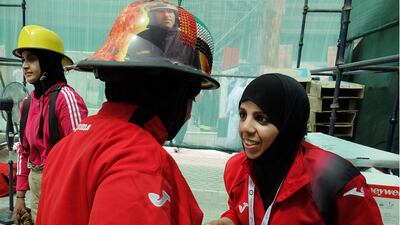In the years I have lived and worked in the Middle East and North Africa I have often been struck by the remarkable and highly educated women leading change in their fields. Whether Saudis like Thoraya Obaid, who led the UN Population Fund, or Norah Al Faiz, with whom I had the privilege to work when she was in charge of girls education, Moroccans like writer and advocate Asma Lamrabet, or Iraqis like the world-renowned and sadly missed architect Zaha Hadid, Arab women have provided me with many of my role models. Perhaps the first was my grandmother, who qualified as a doctor in Baghdad in 1945, and became one of a generation of Iraqi women who saw no boundaries beyond their own abilities and ambitions. She and many like her paved the way for countless other men and women behind them.
Across our region today many women follow in that same tradition. The UAE is playing a leading role in this. Women here hold several prominent ministerial positions, and they are excelling in the professional and corporate worlds. Equally notable is the fact that the empowerment of women and girls has has become a pillar of the UAE’s new policy for foreign aid and international development.
That’s a remarkable step, which highlights how much further we have to go. Despite the fact that girls now perform better than boys in school-level education in most Arab countries, and account for the majority of university students in places like Algeria, Palestine and Saudi Arabia, there remain too few women in leadership positions across the board. Many formal and informal barriers still hinder the progression of hard working and well-qualified women.
That is why I have been so struck by a fellowship programme recently launched in the UAE that offers insights into how policymakers can best support the new crop of young, qualified women to become the change-makers of tomorrow, as my grandmother was.
The programme is focused on agricultural science. Improving food security is a central and urgent problem across the Mena region, as water scarcity grows ever more acute. The region will add 235 million additional inhabitants by 2050, and feeding them will mean that we need to produce ever more food despite shrinking natural resources.
Science is the key to tackle this challenge, but our region is still not harnessing all its great minds. With just 17 per cent of scientists being women, we have the worst academic gender imbalance anywhere in the world. What’s more, a high proportion of those working in agriculture are women, whether tending livestock in Tunisia, growing sorghum in Yemen or carrying out any number of other important jobs in every country. Unless those devising the solutions can take gender into account, we will be failing to support the people whose food production we need to improve.
That’s why I am so encouraged to see the emergence of Tamkeen, a fellowship programme that seeks to attract, develop and empower the next generation of women agricultural scientists in the Arab world. It takes its lead from a successful programme that is already operating in Sub-Saharan Africa. Agriculture does not form as large a part of the economy in Mena as it does in the rest of Africa, but many of the poorest people in our region are farmers. That means policymakers cannot eradicate poverty without helping those farmers to grow more crops. Add to this the enormous food-security challenges caused by a growing population and climate change, and it becomes clear that our region must strengthen its capacity to innovate in agriculture as much as Africa.
Tamkeen will start with scientists from the UAE, Oman, Jordan, Egypt, Lebanon, Palestine, Morocco, Tunisia and Algeria. The programme is run by the International Center for Biosaline Agriculture, based in Dubai, and aims to develop 20 women scientists per year from each country. The one-year, intensive programme is followed up with ongoing support, to strengthen and build women’s scientific skills and capabilities. Tamkeen creates a regional network of Arab women researchers, linking those regional researchers with international counterparts. The effort places women’s scientific contributions at the top of the agenda and in the front of minds. It’s an ambitious set of goals, but if Tamkeen is able to find the resources to reach its desired scale, it will produce within a few years a wave of skilled, empowered and well-connected women working on this important development challenge.
Recently in Dubai, an initial cohort of a dozen fellows convened for the first pilot training sessions. They arrived from some of the greenest, most beautiful spots in the Arab world – the coast of Morocco, the hills of the West Bank, the rich Nile valley. Wherever they were from, they brimmed with the energy, determination and resilience that stems from a clear vision of a better future that they will themselves create.
Meeting these fellows makes you optimistic that people like this will provide their own solutions to the region’s challenges . Whether through Tamkeen, or any number of other great initiatives that are now taking shape, we have the tools to allow women to take their rightful place as leaders in every field. It is up to all of us now to make sure that happens.
Hassan Damluji is head of Middle East relations at the Bill and Melinda Gates Foundation

